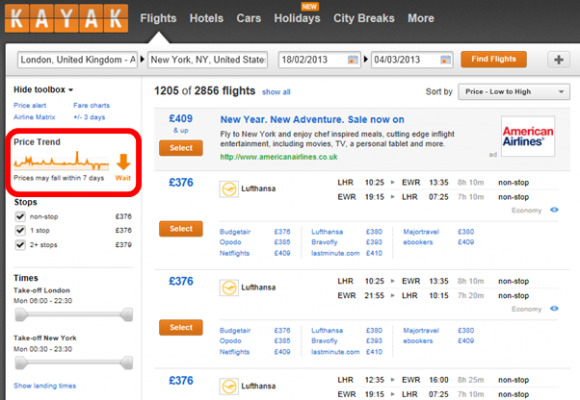Kayak's Price Trend Crunches Big-Data For Travel Save Promise [Updated]
Big data used for small prices: that's the sort of number crunching we can get behind, and with more than billion price records to go on, KAYAK's promise to warn you if airline tickets are likely to rise or fall in the near future could supposedly save you a bundle. The price comparison service has been collecting up queries from the past year of searches, cooking up an algorithm in the process that can suggest you hold out a little longer if it predicts prices might fall within the next seven says, or conversely alerting you to a likely increase. [Updated after the cut]
"Our scientists develop these flight price trend forecasts using algorithms and mathematical models" KAYAK says of the system, which also gives an indication of how certain the company is of each suggestion. "Predictions based on past history can never be perfect, so we can't guarantee they'll be correct, which is why we also let you know the confidence of the statistical analysis."
In the background, meanwhile, KAYAK tracks "a certain number of flights throughout the next seven days (or between your search and departure date whichever is shortest)" and then uses that data to see if its predictions were correct or not. That feeds back into the algorithm and, hopefully, makes it more accurate; obviously that's of little benefit to you if you paid more than you necessarily needed to, unless you opted for a refundable ticket.

We tried KAYAK's new system out with a few test journeys, with Price Trend variously warning us of variations either up or down based on the historic data. Clicking on the graph brings up a pop-up with the confidence percentage, as well as the likely change in fare, and even suggestions as to what day you should consider flying on to get the best deal.
As with any data-crunching system, the proof of KAYAK's algorithm will be over the long-term. Still, with most airlines doing little more than showing a matrix of prices for the week, but preferring to encourage travellers to book now rather than fare-check later, any online travel agent giving more insight has to be a welcome addition.
Update: Thanks to the commenters who pointed out that Bing Travel (aka Farecast) and other services offer their own price prediction systems as well. It's not clear how much data Bing Travel uses to figure out its predictions, and when we tried to do a direct comparison between its forecast and those from KAYAK, Bing sometimes failed to show a Price Predictor at all. Microsoft does warn the following:
"Predictions are only available when searching for:Bing Travel cities indicated in bold when entering your search.
Round trip, economy flights
Popular dates:
U.S. domestic trips from 1 night to 3 weeks long within the next 180 days
Trips to or from Canada from 1 night to 8 days long within the next 90 days
Europe and Caribbean trips up to 2 weeks long within the next 120 days"
In short, as always, checking around multiple airlines and price comparison sites is usually the best way to find the most competitive deal.
